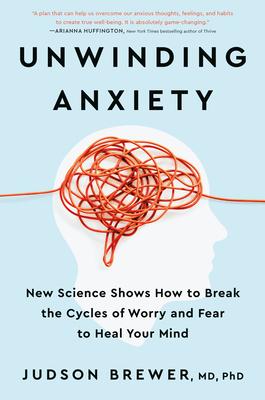There was a lot of interest in this book from my Nonfiction November post about books on habits and productivity, and since I’m finding this book quite useful, I thought I’d share a little more about it.

Brewer is a neuroscientist and psychiatrist who studies habit formation and mindfulness. His website says he is “passionate about understanding how our brains work, and how to use that knowledge to help people make deep, permanent change in their lives”.
Unwinding Anxiety puts together Brewer’s years of research to address the ways that anxiety create negative habits over time. This was a perfect book for me, as I’ve come to see how much anxiety has been holding me back, and not just this year. I’ve always been fascinated by brain research and thinking about how the mind works. I love yoga and meditation and so many of the ideas about mindfulness are nothing new for me. And yet that, on its own, hasn’t been enough.
I imagine many of you haven’t spent hours worrying or feeling sick about problems that don’t actually exist, or even worse, carrying around a sense of dread where you have no idea what it is you’re worried about. That’s the sort of thing this book is about.
Brewer lays out a fairly simple methodology, which he analogizes as the gears of a car. First gear is mapping out your habits. He explains that all habits follow a simple pattern of trigger, action, and reward. Repeated over time, those patterns become embedded in our brain, so that every time the trigger occurs, the brain wants to take the habitual action. (This is also explained in Atomic Habits.)
Identifying habits is a necessary first step, but the next “gear” is mindfulness. Over time, our brain tricks us into wanting rewards that don’t actually help us. For example, many of us who worry excessively have convinced ourselves that worry is necessary, that it helps us succeed in school or work or planning vacations. Mindfulness is meant to help you become aware of the actual impact of the habit, not just what you expect or what it was in the past. An example is with food – you might have “comfort” foods that remind you of happy memories, but in reality you don’t actually like them that much. So mindfulness is being aware of the sensory impacts of something in the present, not just the remembered impact. Brewer counsels us to focus on actual sensations, not judging how something should feel.
Mindfulness can also help you turn your brain on to the fact that some rewards are short-term but have negative impacts in the long term. Judson emphasizes something I’ve also heard in therapy — to keep asking yourself “how is this helping you”?
The third gear is coming up with strategies to replace the habit. Brewer has several strategies for doing this, and they are fairly easy to do. For example, he points out that while you can’t meditate during a stressful work meeting, you can focus on your breathing and even that small action takes you out of the cycle of building anxiety. Two other strategies he describes are “loving kindness” and breaking the “why loop”. The “why loop” is particularly relevant for me — it’s where you worry but you don’t actually know why you’re worrying, and then that makes you feel more anxious because you can’t figure it out, so you can’t fix it. His approach to this is to keep reminding yourself over and over that “the why doesn’t matter.”
Brewer also writes about the importance of curiosity. This felt less relevant for me but my takeaway was similar to what I hear a lot in meditation — explore what you feel without judging, since it’s the judgment that puts you in the anxiety loop. Brewer writes a lot about trying to frame things as positive in your mind rather than negative. For me that feels kind of easier said than done, but he does say that these things need to be practiced repeatedly in order to build a new habit and replace the negative one.
There’s a lot of repetition in this book; in fact, Brewer likes to point out when he’s repeating things because they are important. The repetition of concepts is quite helpful because that makes his ideas easy to remember in stressful situations. Plus the whole point of habit formation is repetition, so hearing the same ideas many times and in slightly different ways was useful.
This is definitely a book I recommend for anyone who is struggling with anxiety or even just wants to understand what it means. For a long time I thought only people who had panic attacks struggled with anxiety, but this book describes several different forms. And for me, it feels like understanding the problem is a pretty big part of the solution.

